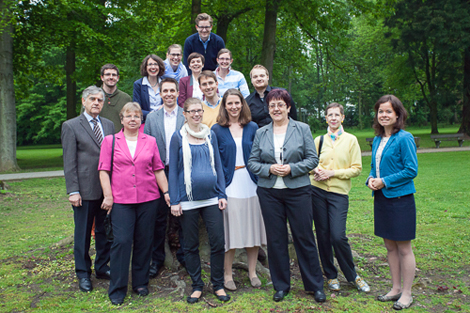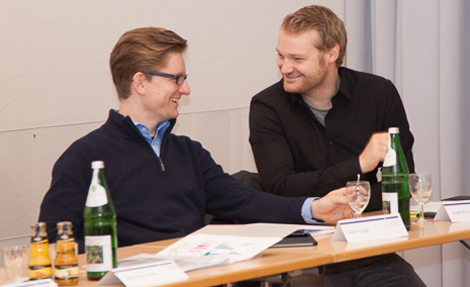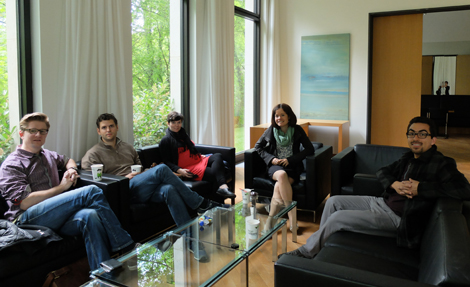Key ideas - Postgraduate Research Group on the Social Market Economy - Begabtenförderung und Kultur
The theoretical concept of the Social Market Economy has been a unique success story for the implementation of economic and societal guidelines into real economic and social orders, both nationally and internationally. This success has at least two reasons:
The first is that in the middle of the 1930s, a group of academics (economists and lawyers) started to draw the right conclusions from the shortcomings of the Weimar Republic, from the international defaults before and after the outbreak of the Great Depression of 1929, and from the centralized economic and social order of the Nazi Regime.
The second reason for success is the way in which the translation of the theory into an economic and social reality was managed. One important factor was that Alfred Müller-Armack, the father of the concept of the Social Market Economy, was both an economist and a sociologist. He was able to adapt the theoretical approaches of the Freiburg School (headed by the economist Walter Eucken and the lawyer Franz Böhm) in a way that addressed the reservations of large parts of the German public towards a market economy. With the “Irenic Formula” (“Irenische Formel”), he created a way to reconcile these different views in the Social Market Economy.

The second extraordinary fact – which is particular to the period after 1945 – is that a large group of economists and lawyers went into politics and took responsibility for the implementation of the new structure. While Ludwig Erhard, Germany’s first Minister of the Economy, was the most prominent example, it holds, too, for Franz Böhm, who left his academic post in order to take up a mandate in the Bundestag. There he formulated and pushed for the implementation of a German competition law. It is true also for Alfred Müller-Armack, who left Cologne University to take up a post at the Ministry of the Economy. All these actors drove forward the realization of a liberal economic order, at times explicitly against the will of the Allied Forces, and in stark contrast to the Keynesian mainstream at the time. The success proved them right.
Today, a great part of the institutional framework still exists. Nevertheless, increasingly, social and economic policies are marked by ignorance of the original principles or their discretionary use. Many of the subsequent actors have chipped away at the principles of the Social Market Economy, emptying the conceptual box and trying to fill it with their special interests. Despite all of this, the general idea of the Social Market Economy is still, at least nominally, the point of reference for social and economic policy. Policies pay lip service even where they disregard its principles.
This paradox or dilemma needs to be made explicit and overcome since it causes long-term societal and economic damage. The political deformations of the type discussed above were never part of the original concept.
The success of the Social Market Economy is founded on a trinity:
Firstly, it follows a clear economic reasoning which is, however, not only based on market processes; it deliberately takes into account the interrelationship between the economy, law and politics.
Secondly, the system is not restricted to only providing the “rational” economic answers; it is also explicitly concerned with the ways in which the solutions to problems can practically be implemented in the political arenas.
Thirdly, the so-called economic miracle (“Wirtschaftswunder”) after 1948 happened mainly thanks to the ability and willingness of academics, who were at home in both theory and politics, to take responsibility to implement their ideas. They convinced the German people by courageous decisions and by their results.

Today’s politicians are not the sole group responsible for the distortions to the core idea of the Social Market Economy. More importantly, there is a real danger that its academic foundations are being eroded. The mainstream in Economics has been specializing in isolated analyses of market equilibria and has increasingly lost touch with the important interactions between institutions, law and politics.
In Germany, many chairs at universities which were in the past teaching and researching questions of “Ordnungspolitik” (the branch of political economy which builds the foundations to the concept of the Soziale Marktwirtschaft) were abolished and substituted by chairs for quantitative macroeconomics.
Many economists today prefer to follow the internal logic of their own narrow branch of the discipline, while they regard the relevance of their research for the political process and reality as being of secondary importance. The limits of this “pure economics” emerge whenever a successful answer for a societal problem depends on the joint consideration of political, legal and cultural implications. Exactly this context is for the most part excluded from models of “pure economics”. Especially economic policy challenges for transition economies and developing countries, questions of international governance and not least the analysis and the need for recommendations to overcome the financial crisis make apparent the limits of this kind of economics. In this respect, mainstream economics has not passed the test of economic realism and its claim for superiority is thus debateable.
The Postgraduate Research Group on the Social Market Economy of the Konrad-Adenauer- Foundation was set up to help overcome these deficits. The Research Group has set itself the goal to give impulses for new thinking on the original Social Market Economy idea, and more generally for a revitalisation and innovation in economic theory. The latter ought to show an awareness of the fact that economic policy is embedded within a wider social structure and be careful to consider its political, ethical and sociological implications. At the same time it aims to look at ways in which the Social Market Economy idea can be made more compatible with and adjustable to the realities of the 21st century.
Research and teaching ought to follow the three pillars outlined above but also include the
empirical, quantitative methods.

The first pillar will be a link between Ordnungspolitik and institutional economics, which aims to deepen our knowledge of market processes. This will be embedded in research about the importance of coherence between market orders and the institutional, legal and political orders of the society and study their interdependencies.
The second pillar is concerned with the question of how to communicate and implement the Social Market Economy concept at the national and international level. This research goes beyond traditional Ordnungspolitik and familiar theories of Public Choice. It has to incorporate approaches which account for “informal institutions” (manners and customs, culture) as well as consider the normative implications of market processes and its institutional framework. This research can take its cues from new findings of the institutional economics and especially the constitutional economics literature.
As to the third pillar - the transformation of scientific findings into policies - the members of the Research Group are called upon to work out “case studies” about the interaction between economic science and economic policy.
It is of utmost importance to give the Research Group a clear and broad international orientation. This includes encouraging members of the group to explore the theoretical orientation towards modern approaches of institutional economics. In this, we see an opportunity to deepen the findings of Walter Eucken about the “Interdependence of Orders”. Internationally, the German Ordnungspolitik and the concept of the Social Market Economy are met with great interest. A closer connection with international research on institutional economics would help to spread the experience with and virtues of the Social Market Economy. We strive for exchange between members of the Research Group and foreign colleagues.
An international outlook is also necessary, as economic policy today is losing its national character; increasingly, decisions with wide-reaching effects are coming from supranational institutions (EU, WTO, G7, G20). The global financial crisis of 2007 is proof for the importance of a transparent, disciplining and coherent institutional framework on all levels. The principles and the experience with the Social Market Economy offer good examples and benchmarks to guide international economic policy.
This approach presents a unique opportunity to overcome the one-sidedness often found in current mainstream economics. The combination of both approaches is the king’s road to a kind of economics, which is capable to provide relevant advice and recommendations for economic policy at the national and international level.


